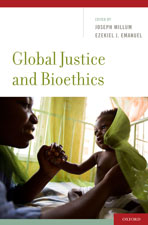What we're reading: Global Justice and Bioethics
March / April 2012 | Volume 11, Issue 2

Fogarty bioethicist
Dr. Joseph Millum
co-edited Global Justice
and Bioethics.
Fogarty bioethicist Dr. Joseph Millum co-edited Global Justice and Bioethics, a collection of original essays with Dr. Ezekiel J. Emanuel, former bioethicist at the NIH Clinical Center. This book, published by Oxford University Press, is the first to comprehensively address the intersection of global justice and bioethical dilemmas, through original essays by leading thinkers in political theory, philosophy and bioethics. The authors address the key issues concerning global justice and bioethics from two perspectives.
The first is ideal theory, which is concerned with the social institutions that would regulate a just world. What is the relationship between human rights and the provision of health care? How, if at all, should a global order distinguish between obligations to compatriots and others?
The second perspective is from non-ideal theory, which governs how people should behave in the unjust world that exists. What sort of medical care should actual researchers working in impoverished countries offer their subjects? What should NGOs do in the face of cultural practices which they deem unethical? If coordinated international action will not happen, what ought individual states to do?
Over the last decade or so, there has been an explosion of interest in the philosophical issues surrounding global justice. These issues are of direct relevance to bioethics. The links between poverty and health imply questions of global health cannot be separated from questions about fair distribution of global resources and the institutions governing the world order. Similarly, as increasing numbers of medical trials are conducted in the developing world, researchers and their sponsors have to confront the special problems of doing research in an unjust world, with corresponding obligations to correct injustice and avoid exploitation.
More Information
To view Adobe PDF files,
download current, free accessible plug-ins from Adobe's website.
Related Global Health Research Topics